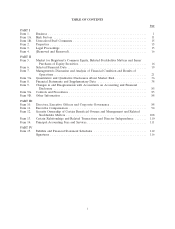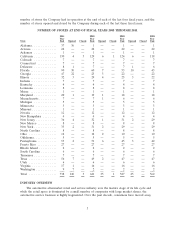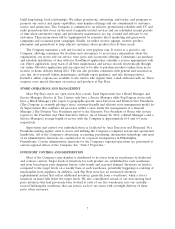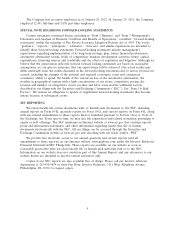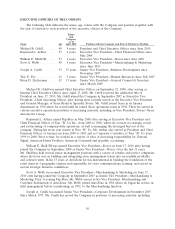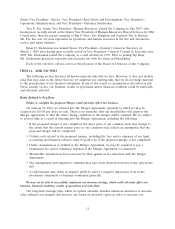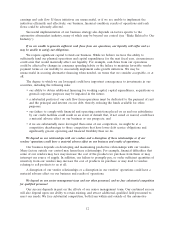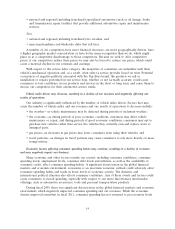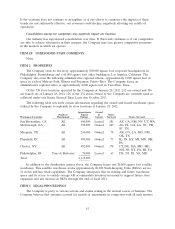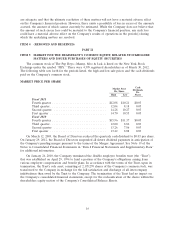Pep Boys 2011 Annual Report Download - page 50
Download and view the complete annual report
Please find page 50 of the 2011 Pep Boys annual report below. You can navigate through the pages in the report by either clicking on the pages listed below, or by using the keyword search tool below to find specific information within the annual report.Each Pep Boys Supercenter and Pep Express store carries a similar product line, with variations
based on the number and type of cars in the market where the store is located, while a Pep Boys
Service & Tire Center carries tires and a limited selection of our products. A full complement of
inventory at a typical Supercenter includes an average of approximately 27,000 items, while Service &
Tire Centers average approximately 2,000 items. The Company’s product lines include: tires (not
stocked at Pep Express stores); batteries; new and remanufactured parts for domestic and import
vehicles; chemicals and maintenance items; fashion, electronic, and performance accessories; and a
limited amount of select non-automotive merchandise that appeals to automotive ‘‘Do-It-Yourself’’
customers, such as generators, power tools and personal transportation products.
In addition to offering a wide variety of high quality name brand products, the Company sells an
array of high quality products under various private label names. The Company sells tires under the
names DEFINITY, FUTURA# and CORNELL#, and batteries under the name PROSTART#. The
Company also sells wheel covers under the name FUTURA#; water pumps and cooling system parts
under the name PROCOOL#; air filters, anti-freeze, chemicals, cv axles, hub assemblies, lubricants, oil,
oil filters, oil treatments, transmission fluids, custom wheels and wiper blades under the name
PROLINE#; alternators, battery booster packs, alkaline type batteries and starters under the name
PROSTART#; power steering hoses, chassis parts and power steering pumps under the name
PROSTEER#; brakes under the name PROSTOP# and brakes, batteries, starters, ignitions and chassis
under the name VALUEGRADE. All products sold by the Company under various private label names
were approximately 26% of the Company’s merchandise sales in fiscal 2011, and 31% in both fiscal
2010 and 2009.
The Company’s commercial automotive parts delivery program, branded PEP EXPRESS PARTS#,
is designed to increase the Company’s market share with the professional installer and to leverage
inventory investment. The program satisfies the commercial customer’s automotive inventory needs by
taking advantage of the breadth and quality of the Company’s parts inventory as well as its experience
supplying its own service bays and mechanics. As of January 28, 2012, approximately 81% or 459 of the
Company’s 569 Supercenters and Pep Express stores provided commercial parts delivery as compared
to approximately 80% or 454 stores at the end of fiscal 2010.
The Company also operates 15 Speed Shops, a store-in-a-store concept within existing
Supercenters that creates a differentiated retail experience for automotive enthusiasts by stocking high-
performance and specialty products, and has expert sales and installation technicians resident in 79
Supercenters to assist customers with automotive electronics products such as stereos, speakers,
amplifiers, remote starters and alarm systems.
The Company has a point-of-sale system in all of its stores, which gathers sales and inventory data
by stock-keeping unit from each store on a daily basis. This information is then used by the Company
to help formulate its pricing, inventory, marketing, and merchandising strategies. The Company has an
electronic parts catalog that allows our employees to efficiently look up the parts that our customers
need and to provide complete job solutions, advice and information for customer vehicles. The
Company has an electronic work order system in all of its service centers. This system creates a service
history for each vehicle, provides customers with a comprehensive sales document and enables the
Company to maintain a service customer database.
The Company primarily uses an ‘‘Everyday Low Price’’ (EDLP) strategy in establishing its selling
prices. Management believes that EDLP provides better value to its customers on a day-to-day basis,
helps level customer demand and allows more efficient management of inventories. On a periodic basis,
the Company employs a promotional pricing strategy on select items and service offers to drive
increased customer traffic.
We believe that targeted advertising and promotions play important roles in succeeding in today’s
environment. We are constantly working to understand our customers’ wants and needs so that we can
6






